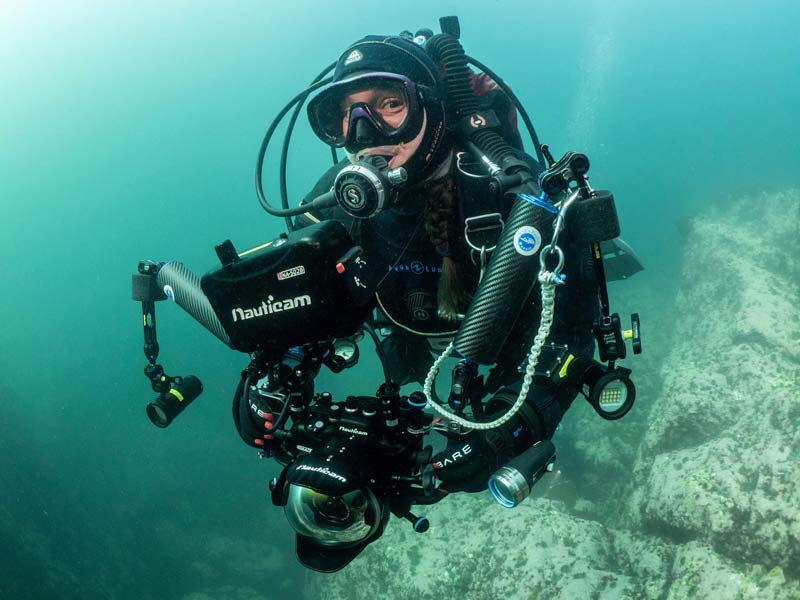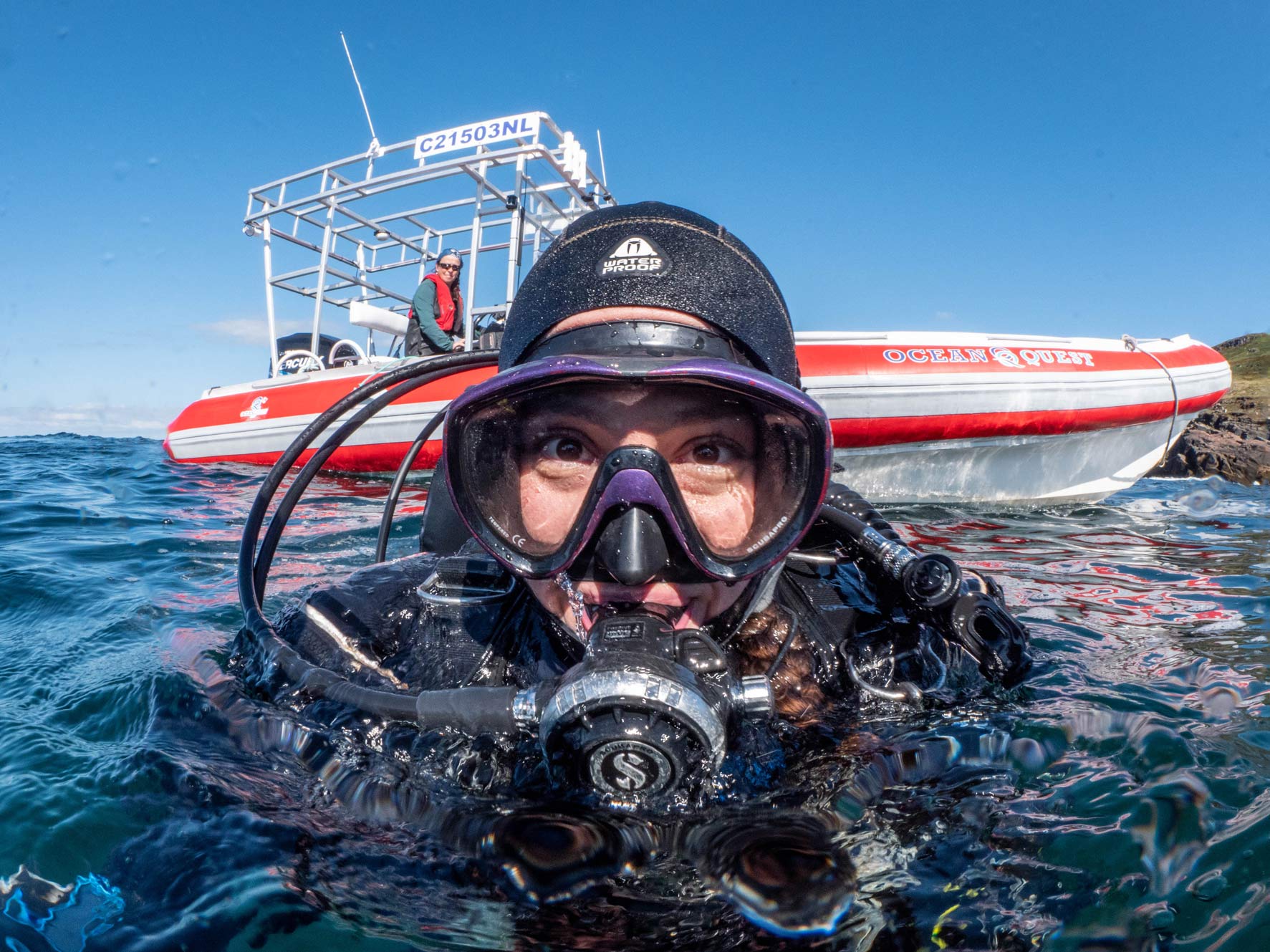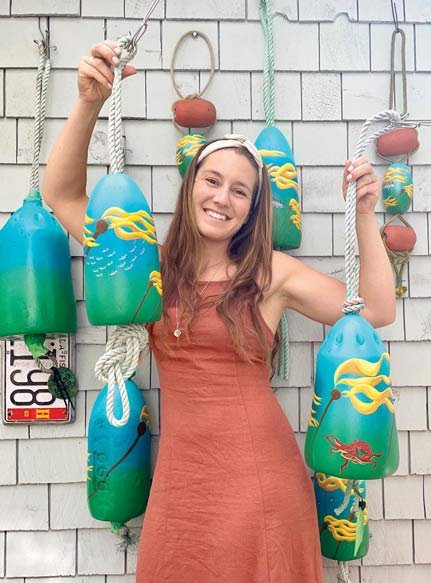DIVER Interview: Tiare Boyes

How long have you been diving?
I did my open water on Vancouver Island with my dad during a freezing cold week in January. That was 19 years ago. I was 12 years old and remember being electrical taped into my wrist and neck seals because they didn’t have suits small enough!
What made you want to become a diver?
I grew up spending a lot of my childhood at beaches peering into tide pools, at the dock where the pilings were covered in marine line and working on my father’s wooden fishing schooner. My family would travel the coast on our boat and I always wanted to know what was under the water’s surface. Once I got my diving certification it was like a passport into another world.
Most memorable marine life encounter?
My most special moments underwater have always been sharing space with an octopus. They are such incredible, intelligent creatures. One time I found one out in the open, cruising the reef. It reached out and touched my hand. I froze and it got a firm grip, then took off again cruising over the reef towing me behind it for a few minutes. Then it let go and continued on its way.
How did diving change your life?
Every time I jump in the water my heart rate slows down, I become mindful of my breath, and I get lost in the incredible life around me. Diving brought me back to being enthralled by nature, something I sometimes forget to do on land in all the everyday the hustle and bustle.

What does diving mean to you?
Diving is where I go to work, where I go to play, and where I go to meditate. Sometimes I get to do all three at once and it is the best!
You are from a fishing family, how has that affected your life as a diver?
Working on a small commercial fishing boat ignited my fascination with marine life. I wanted to know more about the fish we were catching, about where they live and why they evolved to be what they are today, and how we ensure that what we catch today doesn’t sacrifice the health of our coastal ecosystems. In the fishing community I grew up in, there was a deep knowledge that our livelihood and the food we put on our table directly depended on the health of the marine ecosystems we went to work in everyday. There was no separation between the natural world and the human world. I was raised foremost to respect the fish we harvested and to value them for much more than a paycheque. This translates into the kind of diver I am. I am just a visitor in the underwater world and I need to act respectfully to those whose home I am visiting.
Has experience in the fishing industry given you conflicts or new perspectives?
I have never felt a conflict between being a fisherman and being a diver, except that even after all these years I still feel uncomfortable killing a living thing like a halibut. But I think it is important to be uncomfortable with taking a life, it is no small thing.
Here on the West Coast of Canada we have many fisheries that we can be proud of and some that are world leaders in sustainability. I work in the Wild Pacific Halibut fishery, a fishery that David Suzuki called “the most rigorously monitored in the world”. I am a commercial fish harvester and I am a conservationist, these two things should not conflict. As a fisherman I need to acknowledge that we need to protect and conserve fish stocks and treat them with respect; as a conservationist I need to acknowledge that seafood can be one of the least impactful forms of protein to consume (impact measured in fossil fuel emissions, fresh water usage, energy consumption, and pollution from agricultural run off). We can’t rely on one source of protein to fight world hunger; we need to diversify. A diverse system is a more resilient system, and we certainly need resiliency in these times.
I want to underline that there are many fisheries around the world that are not healthy, we have a lot of work to do to end overfishing and destructive fishing practices locally and around the world. Even the fisheries that are doing well need to be re-assessed on a consistent basis to make improvements to stock assessment science and fishing technologies.
My undergraduate degree is in environmental studies. For four years I learned how terribly humans have treated the Earth. I knew there was another side to the story, having lived it every summer at sea, so when I pursued my masters I chose a multidisciplinary program and got a much more nuanced perspective. Of course, we can do much better as humans, we need to do better for our blue planet.
You’ve spent years being a dive guide in a cold water paradise, what have you learned from these experiences?
I’ve been working in the waters of Port Hardy, British Columbia for neary a decade now, first on the Nautilus Swell and I am now currently with God’s Pocket. The two most important lessons I’ve learned is to go with the flow (because kicking into the current is useless) and that the best way to warm up from a cold dive is to work.
This area of the world attracts a certain type of diver, adventurous and a little eccentric. Who else would spend hours in 44˚F (7˚C) water, hunting for a little sculpin known for the grunting noises it makes, or being swept along in currents just to get a glimpse of the famous Browning Wall in all its yellow, reds, purple, and green splendour? Our guests are from all over the world and from all different professions, but we all have one thing in common: a deep and true love for cold water diving and we are willing to put up with numb fingers and frosty toes for that opportunity.

I heard you’ve given some important speeches – even at the UN, how was that?
Absolutely terrifying, but really empowering at the same time. I’ve been on the Private Sector Mechanism (PSM) to the Committee on World Food Security since 2016, when I went for the first time while I was pursuing my master’s degree. At this massive meeting to try to achieve the UN’s Sustainable Development Goals (SDGs). I was one of two people on the PSM that actually produced food with my own hands and the only female youth. It was crazy. This has changed, the last year I attended there were 72 youth in agriculture from around the world in attendance. I worked with these people to found a youth council that is up and running today bringing young, food-producing voices from all over the world to the global stage. Yet even this year I was still the only young female fish harvester there. Globally 2.6 billion people depend on fish and seafood as their primary source of protein and around 200 million people depend on the ocean for their livelihoods, yet seafood is often left off the table when world leaders discuss food security. I came to understand that my voice, as a young female fish harvester, was one that was nowhere to be found at these high-level meetings; it’s one that needs to be heard. Today I have pulled back from being out in front and am focusing on getting get other, younger, fish harvesters engaged in these high-level discussions.
You’ve just completed your commercial certification, what was that like?
I definitely learned a ton of new things. One of our projects was to build a bird house underwater (including measuring and cutting the wood with a handsaw) which was definitely a first for me. I am hoping to use my certification to do more work in the film industry, and to do scientific surveys and restoration projects. Even though I have a few dives under my (weight) belt, I still have so much to learn. I learn something new every dive!
What keeps your love of diving unwavering?
It is what I love! Nothing beats the joy of being underwater for me, even after a long, cold day working under the waves I have a deep feeling of satisfaction when I surface. I think it is the total immersion in a task at hand. Down there, there are no distractions. You are always, fully, living in the moment. All of the fish and marine life are endlessly fascinating to me! I can watch a hermit crab do its thing all day and never get bored.
How important is a diverse skillset to you?
I certainly derive a lot of pride from being a Jill of many trades, master of none. As a professional diver you need to be able to fix your own gear, have a willingness to learn new skills, should have basic seamanship skills, have a consistently positive attitude (no matter how hard it is raining)—and knowing how to bake a mean batch of cookies is always useful (because it makes those around you happy).
 Your artwork is fabulous! How did this come about and why is it important to you?
Your artwork is fabulous! How did this come about and why is it important to you?
Thank you so much for your kind words. I started painting buoys a few years ago, we had one kicking around our house and one day I decided to paint my favourite thing on it, a bull kelp forest. Friends were generous with their compliments, so I started painting them as gifts. Then somebody offered to buy one and it has snowballed from there. I had a gallery showing this year and now have a waiting list of 50 people! If I am not diving in a kelp forest, you can usually find me painting one these days!
I source my buoys from local fishermen and beach combers. This summer the Marine Debris Removal (MDRI) project removed a total of 204 metric tonnes of marine debris from the very outer coast of the Great Bear Rainforest.
They collected a huge number of buoys off the beaches and donated some of them to me to turn into art. With my artwork comes the story of where it was found and what it might have been used for. While I can’t paint on straws or plastic bags, I can repurpose old buoys into art. I want my work to make people think about where their everyday plastic items end up, either in a landfill or in our oceans.
I also donate 10% of the sales to the Ucluelet Aquarium’s Marine Debris Initiative, or another local Vancouver Island marine charities.
Who is your go-to dive buddy?
When I am home, I spend a lot of time underwater with the very experienced and excellent Bryan Kilback. Skye Augustine is one of my favourite underwater adventure buddies. When I am up at God’s Pocket, I get 12 new dive buddies every week, and I love to work on film projects with the talented Maxwel Hohn.
What is your favourite dive site?
It is hard to choose just one. I love diving Browning Pass, BC: Aquarium with the sunlight filtering through the giant plumose anemones; I love the colourful wall on 7 Tree; I have many wolf eels at Fantasy Island I have been diving with for nine years whom I love to visit; but I think the best diving I have ever experienced is in the Inian Islands in Alaska. The diverse, dense, and insanely colourful life up there is absolutely mind-blowing.
Where would you like to dive but haven’t?
I would love to dive in the Antarctic or in Scotland.
Favourite dive snack?
Hot soup or organic Hornby Island Energy Bars.
Favourite diving movie?
Life Aquatic – because 11 and a half was also my favourite age.
Proudest diving moment or achievement?
Building that bloody birdhouse!
What’s the craziest thing you’ve seen?
Watching an octopus nest hatch is pretty mind-blowing. Once I watched a wolf eel I have visited since 2013 and nicknamed Waldorf with his mate as their eggs hatched, that was pretty special (for me, I am sure they were just annoyed at a loud bubble-breather lurking around their den).
What’s next for you?
More diving! I’ve got some interesting film work coming up and I am excited to jump into it.
For more on Tiare visit: www.tiareboyes.com
For her Instagram, visit: www.instagram.com/tiarebuoys
Leave a Comment







